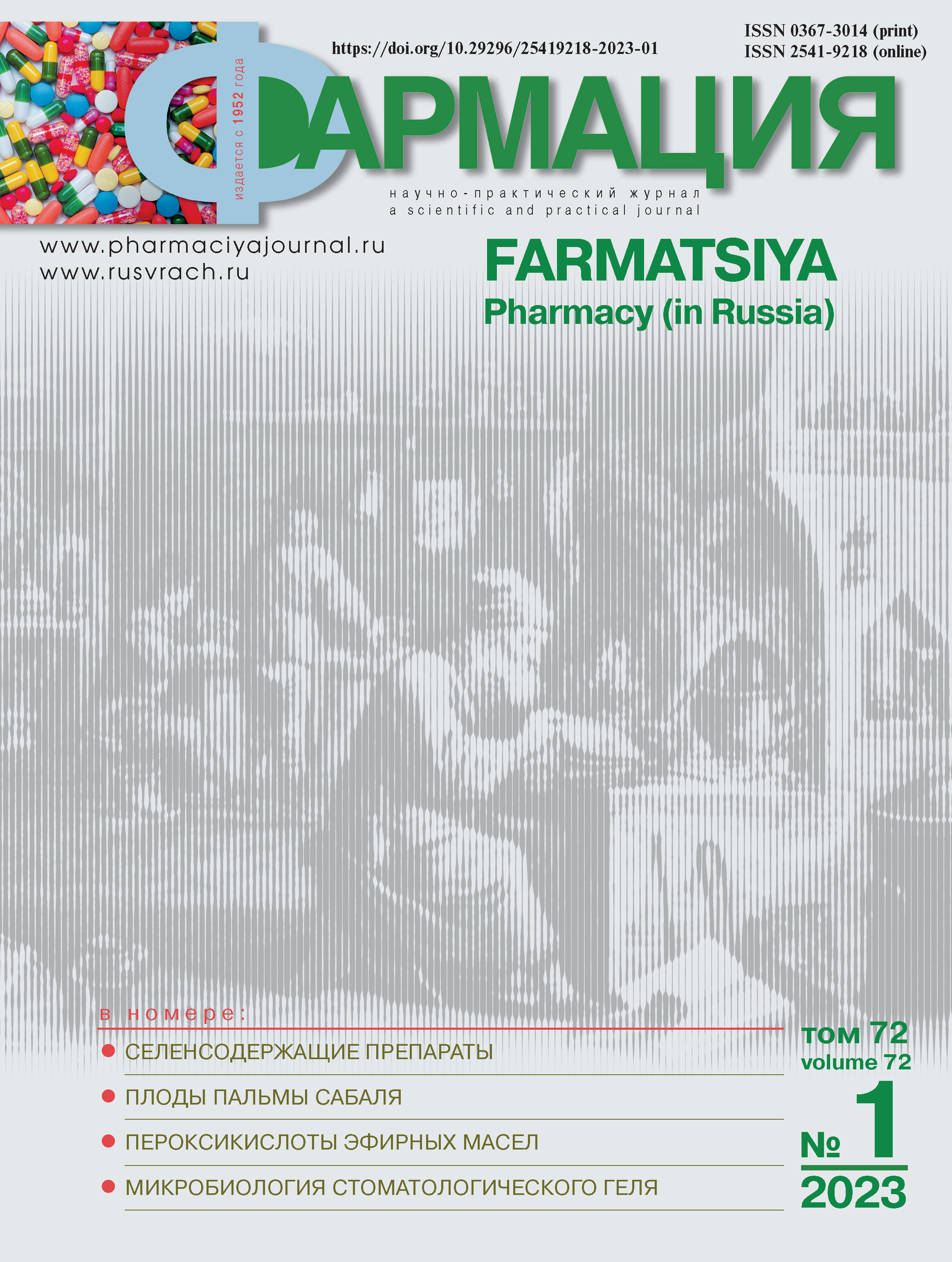Regulation of the antioxidant defense system in the liver of white rats against the background of drug-induced hepatitis
- 作者: Baghirov I.M.1, Guliyeva S.V.1
-
隶属关系:
- Azerbaijan Medical University
- 期: 卷 72, 编号 1 (2023)
- 页面: 49-55
- 栏目: Pharmacology: Experiment and clinic
- URL: https://journals.eco-vector.com/0367-3014/article/view/313328
- DOI: https://doi.org/10.29296/25419218-2023-01-07
- ID: 313328
如何引用文章
详细
Introduction. Medicinal hepatitis is one of the pathologies characteristic of modern times. The cause of the disease is taking medications without medical supervision and, on the other hand, an increase in the range of drugs with a hepatotoxic effect.
Purpose of the study. To study the antioxidant effect created at the Scientific Research Center of the Azerbaijan Medical University by Professor Kh.I. Gasanov of the complex compound (C8H12ON)2 [PdCl4], synthesized on the basis of palladium and mexidol.
Material and methods. To study its effect on a living organism, an experiment was conducted on 30 outbred white rats. The experimental animals were divided into 6 groups of 5 animals each.
Results and discussions. 3 days after the modeling of medicinal hepatitis in the liver tissue, a weakening of the antioxidant defense system was observed. The obtained results show that the model of medicinal hepatitis created using paracetamol was stable, and the concentration of markers of the antioxidant defense system in the homogenate continued to decrease, despite the 10th day after the creation of the pathological process. As a result of exposure to KSPM introduced into the body, the average concentration of markers of the antioxidant defense system in the liver homogenate increased significantly. There was also an increase in the concentration of PB-SH, the concentration of the internal group of the protein-SH, peroxidase activity, catalase activity and TAA.
Conclusion. It has been established that the drug increases the concentration of markers of the antioxidant defense system in the liver of white rats, created against the background of a hepatitis model. The effect of the synthesized biologically active substance depends on the time of its introduction into the body.
全文:
作者简介
Ismail Baghirov
Azerbaijan Medical University
Email: Mamed_2016@list.ru
ORCID iD: 0000-0003-0145-8390
Candidate of Philological Sciences, full-time doctoral student
阿塞拜疆, 23, Bakikhanov str., BakuSevda Guliyeva
Azerbaijan Medical University
编辑信件的主要联系方式.
Email: sevda.quliyeva.1970@mail.ru
ORCID iD: 0000-0002-6064-4081
Candidate of Biological Sciences, Associate Professor, Head of the Department of Biochemistry of the Research Center
阿塞拜疆, 23, Bakikhanov str., Baku参考
- Perverzev A.P., Ostroumova O.D., Kochetikov A.I. Cholestatic variant of drug-induced liver injury. Kachestvennaja klinicheskaja praktika. 2020; 3: 61–74 (in Russian).
- Gubergric N.B. Beljaeva N.V., Klochkov A.E. Drug-induced liver injury: from pathogenesis to treatment. Vestnik klubu pankreatologov. 2020; 72–80. doi: 10.33149/vkp.2020.01.10 (in Russian).
- Lazebnik L.B., Golovanova E.V., Hylynova O.V. Drug-induced liver injury (DILI) in adults. Jeksperimental'naja i klinicheskaja gastrojentrologija. 2020; 174 (2): 29–54. doi: 10.31146/1682-8658-ecg-174-2-29-54 (in Russian).
- Ivashkin V. T., Baranovskij A. Ju., Rajhel'son K. L., Pal'gova L. K., Maevskaja M. V., Kondrashina Je. A., Marchenko N. V., Nekrasova T. P., Nikitin I. G. Lekarstvennye porazhenija pecheni (klinicheskie rekomendacii dlja vrachej). Rus J. Gastroenterol Hepatol Coloproctol. 2019; 29 (1): 101–31. doi: 10.22416/1382-4376-2019-29-1-101-131 (in Russian).
- Ushkalova E.A., Korovjakova Je.A. Drug-induced liver damage with the use of antibacterial agents. Lech. vrach. 2012; 2: 84–8. https://www.lvrach.ru/2012/02/15435356 (in Russian).
- Efimenko I.A., Churakova A.V., Ivanova N.A. Erofeva O.S. Nekotorye aspekty biologicheskoj aktivnosti koordinacionnyh soedinenij palladija. Z-aja Vserossijskaja nauchnaja konferencija (s mezhdunarodnym uchastiem): Uspehi sinteza i kompleksobrazovanija. Tezisy dokladov. 2014 (in Russian).
- Kuznecov N.B., Kuznecov P.E. Prediction of the biological activity of kappa-opioid receptor ligands. Auditorium. 2015; 4: 8–18 (in Russian).
- Gasanov H.I., Mirzai Dzh.I., Mamedova I.I., Kasumov Sh.G. Koordinacionnye soedinenija platiny (II) i palladija (II) s sero-kislorodsoderzhashhimi biologicheski aktivnymi ligandami [Coordination compounds of platinum (II) and palladium (II) with sulfur-oxygen-containing biologically active ligands]. Baku, 2012 (in Russian).
- Revjakin A.O., Kapanadze G.D., Kasinsskaja N.V. Modeling drug-induced toxic hepatitis in rats. Biomedicina. 2014; 1: 52–3 (in Russian).
- Ellman G.L. Tissue sulfhydryle groups. Archives of Biochemistry and Biophysics. 1959; 82 (1): 70–7. doi: 10.1016/0003-9861(59)90090-6
- Bergmeyer H.U. Biochemistry information. Methods of enzymatic analysis. Verlag chemie. 1974; 2: 45–7.
- Spektor E.V. Method for determining the antioxidant activity of blood serum. Lab. delo. 1984; 1: 26–9 (in Russian).
- Sokolov I.D., Sokolova E.I, Troshin L.P., Medved' O.M., Koltakov, S.Ju. Biometrija [Biometrics]. Krasnodar: KubGAU, 2018 (in Russian).
- Kuzenko M.S. Statistics in biomedical research. Fiziko-matematicheskie nauki. 2017; 2 (64): 1–10 (in Russian).
- Corin I.B. Statistical processing of qualitative (categorical) data in pharmacological studies. Farmakokinetika i farmakodinamika. 2019; 2: 3–18 (in Russian).
- Mjurrej A. Jeffektivnaja rabota v Microsoft Excel [Work effectively in Microsoft Excel]. Moskva: DMK Press, 2021 (in Russian).
补充文件







